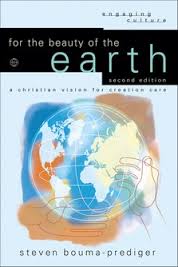
For the Beauty of the Earth: A Christian Vision for Creation Care
By: Steven Bouma-Prediger
Book Report By: Sarah Shannon
I was fortunate enough to have a theology class entitled ‘God and Nature’ with Dr. Bouma-Prediger during my time at Creation Care Study Program in New Zealand. For the Beauty of the Earth: A Christian Vision for Creation Care was our assigned text for this theology course. I chose to reread this book because at the time, I did not appreciate it as much as I could have. This is a very challenging book and therefore there are many concepts that I cannot cover in detail, or do not cover as well as I could.
“Whatever is foreseen in joy
Must be lived out from day to day.
Vision held open in the dark
By our ten thousand days of work.
Harvest will fill the barn; for that
The hand must ache, the face must sweat.
And yet no leaf or grain is filled
By work of ours; the field is tilled
And left to grace. That we may reap,
Great work is done while we’re asleep.
When we work well, a Sabbath mood
Rests on our day, and finds it good.”[1]
“What does ecology have to do with theology?”[2] is one of the first lines in Steven Bouma-Prediger’s book, For the Beauty of the Earth: A Christian Vision for Creation Care. It’s a good question and one that I had never considered until college. Bouma-Prediger answers his opening question with the words of Thomas Aquinas saying “’Any error about creation also leads to an error about God.’ If we do not properly understand our home planet, we will not properly understand the nature and character of the God we worship and claim to serve.”[3] This is a frightening statement, especially if you’re not someone who has studied ecology or really cared about our planet before.
In chapter one, Bouma-Prediger argues that without an understanding of our ecological place, human kind cannot adequately care for that environment. He asks very pointed questions such as, where does our water come from? Where does our trash go? Name five trees native to your region? What are five invasive species? When was the last full moon? What kind of soil is in your yard? Silty, loamy sand, or sandy clay? Can you answer even one of those questions?[4]
He suggests that this lack of knowledge makes us ecologically illiterate, leading to the degradation of creation. Our lack of knowing where we live, beyond streets and geographical land marks, contributes to our lack of care for and about creation; for knowledge and familiarity lend themselves to love and affection. The more we know, the more we care and the more we care the more we can act in a responsible manner to address the problems Earth faces.
Bouma-Prediger follows this chapter with a survey of the current state of the planet, using a number of scientific studies, with the conclusion that Earth is not doing well at all and then goes on to address ‘the ecological complaint against Christianity’ in chapter three. This complaint against Christianity mostly stems from a misinterpretation of biblical texts, one example being Genesis 1:28. Genesis 1 and 2 speaks about humans in terms of being and doing. Who we are and what we should do in light of that, with a clear divide between humans and non-humans. In Genesis, Adam gives all the creatures names and “to name properly implies knowledge of essence, to get the name right, one must ultimately know the creature named…to name is to have power.”[5] We are called, in Genesis 1:28, to have dominion and rule over all creation and that is an enormous position of power. But how are we to do that and do it well? Bouma-Prediger points to Psalm 72 as a description of the ideal ruler, one who is willing to serve and suffer for the good of the other. To rule well is a calling to serve and protect creation and our dominion, our rule, should be one of service and sacrifice.[6]
In chapter four, the author goes on to examine scripture in a different light asking pointed questions such as “Where are we?” in the context of the creation story. He concludes that we are “in a world of wonders, wisely ordered by God”[7] and that this creation, all of it, is good, and home to all earthly creatures, not just humans. Bouma-Prediger also asks “With whom does God make a covenant?”[8] exploring the story of Noah and the flood, and how God’s divine covenant is established between Noah and every living creature, not just humanity.[9] Another question that is asked is “who is the center of things?”[10] This question is addressed using the story of Job, specifically chapters 38-42. In these four chapters “our anthropocentric pretensions are laid to waste” as the Lord speaks about his creatures and his power to create beings such as the Behemoth and Leviathan. We, as humans, are only part of the entirety of creation, just a part and these chapters in the book of Job are an excellent reminder.[11] We are, according to Aldo Leopold “’plain member[s] and citizen[s]’ of the land community. God, not humanity, is at the center of things.”[12]
In chapters five through seven Bouma-Prediger goes on to discuss how we as Christians should think about the earth, God, and our relationship to it and all its creatures, with the knowledge that everything on earth is interconnected.[13] He lays out a proposed vision for Christian theology and ethics towards creation, affirming that, as followers of Christ, we are committed to the full authority of Scripture and are aware of the many ways we have harmed creation, with the belief that biblical faith is necessary to the solution of our ecological problems.[14] This statement includes a theocentric vision for the lives of all creatures, belief in the Doctrine of the Trinity and the power of the Holy Spirit, combine with the recognition that we are made in the image of God, but that sin “fundamentally breaks God’s shalom.”[15] We are not God and we must have hope in the resurrection knowing that it is God’s good future and that through it, “the restoration and renewal of creation has begun.”[16] Bouma-Pediger writes that we are being challenged to live more earth-friendly lives and that “this is not optional. We will either heed this call in obedience and gratitude, or we will, by neglect or malice, fail to act in ways that reflect God’s desire for shalom.”[17]
Bouma-Prediger begins the conclusion of For the Beauty of the Earth with a quote from Dr. Seuss’s The Lorax. “Unless someone like you cares a whole awful lot, nothing is going to get better. It’s not.”[18] And Dr. Seuss is right. Unless Christians come together and really begin focusing on using our resources wisely, our finite planet is in trouble. Care for creation effects all things, the poor and marginalized, our future children, and our own quality of life. Imago Dei means that God’s concerns are ours, the things that break his heart are supposed to break ours and the things he cares about, we are supposed to as well.[19] I’ll leave you with Bouma-Prediger’s own words as a conclusion.
“So why care for the earth? For many reasons – many good reasons. Because our own existence in imperiled. Because we owe it to our children. Because an earth-friendly way of life is more joyful. Because various forms of oppression are of a piece. Because certain non-human creatures are entitled to our care. Because the earth is valuable for its own sake. Because it is in the best interests of the entire earth community. Because God says so. Because we are God’s image-bearers. Because grace begets gratitude and gratitude care. Because, in sum, care for the earth is integral to what it means to be a Christian – it is an important part of our piety, our spirituality, our collective way of being authentically Christian. And care for the earth expresses the fullness and vastness of the God whom we love and serve.”[20]
[1] Wendell Berry, “Whatever Is Foreseen in Joy.” A Timbered Choir: The Sabbath Poems 1979-1997 (Washington, D.C.: Counterpoint, 1998), pg 18.
[2] (Bouma-Prediger 2001) 13.
[3] 14.
[4] 21.
[5] (Bouma-Prediger 2001) 73.
[6] 74.
[7] 95.
[8] 96.
[9] Genesis 6:8
[10] (Bouma-Prediger 2001) 100.
[11] 102.
[12] 103.
[13] 117.
[14] 119.
[15] (Bouma-Prediger 2001) 123.
[16] 125.
[17] 135.
[18] 163.
[19] 176.
[20] 179.
